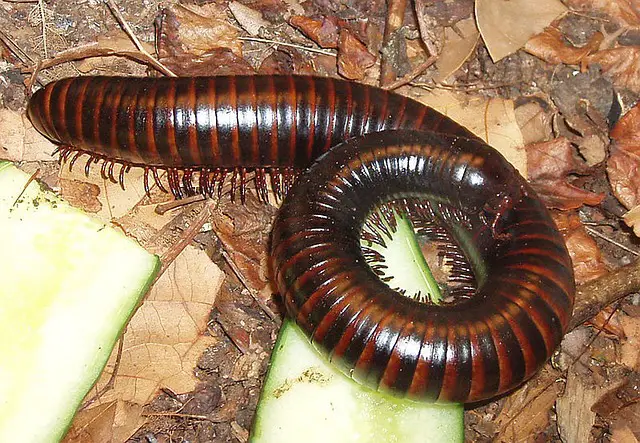What do millipedes eat? This is a question that many people have, especially those who are gardeners. In this blog post, we will discuss the eating habits of millipedes and also compare them to the eating habits of another popular garden pest: the caterpillar. We will also answer the question “Can millipedes eat kale?” Keep reading to learn more.
Do millipedes eat kale specifically, or any other vegetables or fruits?
Millipedes are not picky eaters and will pretty much consume any decaying leaf or vegetable matter they come across.
This includes all sorts of fruits and vegetables, such as kale.
In fact, millipedes are often found in gardens because of the abundance of food.
While millipedes do not typically eat living plants, they will sometimes chew on soft fruit, such as overripe bananas.
Millipedes are actually beneficial to gardens because they help to break down organic matter and recycle nutrients back into the soil. So if you spot a millipede munching on your kale, don’t be too quick to shoo it away.
Will millipedes destroy kale plants
No, millipedes will not destroy kale plants.
Millipedes are actually experts at eating dead and decaying plant matter. This is why they are often found in gardens, where they help to break down dead leaves and other organic debris.
Kale plants are not made up of dead leaves or other organic debris.
Therefore, millipedes would have no interest in eating them. In fact, millipedes can actually be beneficial for kale plants.
By eating dead leaves and other organic matter, millipedes help to improve the health of the soil. This can lead to healthier plants, including kale plants. So, rather than being a threat, millipedes can actually be an ally for kale plants.
Is it OK to feed pet millipedes kale in captivity?
When it comes to feeding pet millipedes, kale is generally safe.
This dark, leafy green vegetable is a good source of vitamins and minerals, and it can help keep pet millipedes healthy. However, kale should not be the only food that pet millipedes eat.
A varied diet is important for all animals, and pet millipedes should also have access to other fresh fruits and vegetables.
If you’re not sure what to feed your pet millipede, consult with a veterinarian or experienced pet owner for guidance.
Are there any dangers associated with having millipedes in your garden or home, such as diseases they may carry or damage they may cause to plants and property?
Millipedes are generally harmless creatures that are often found in gardens and homes. While they are not known to carry any diseases, they can sometimes cause damage to plants.
Millipedes feed on decomposing plant matter, and their sharp claws can sometimes tear the leaves of plants. In addition, millipedes can also damage property.
Their hard bodies can scratch surfaces, and their ♥♥claws can leave marks on floors and walls. Although they are not usually considered pests, millipedes can occasionally cause problems for homeowners.
How can you get rid of millipedes if they become a problem in your garden or home?
Millipedes are usually harmless creatures that help to break down organic matter in the soil. However, they can become a problem if they invade your garden or home in large numbers.
If millipedes are causing difficulties, there are a number of steps you can take to get rid of them. First, try to reduce the amount of moisture in your garden by watering less frequently and removing any sources of standing water.
Millipedes require high levels of moisture to survive, so making your garden less hospitable will help to discourage them.
You can also try using barriers such as diatomaceous earth or sand around the perimeter of your garden to prevent millipedes from entering.
If millipedes have already made their way into your home, vacuuming them up is usually the most effective way to remove them. However, be sure to empty the vacuum bag afterward to prevent the millipedes from simply crawling back out again.
With a little effort, you can get rid of millipedes and keep them from returning in the future.
Are there any benefits to having millipedes around, such as helping to control pests or breaking down organic matter into compost?
Many people view millipedes as pests, but there are actually a number of benefits to having them around. For one thing, millipedes help to control other pests, such as insects and snails.
They do this by eating the pests, or by competing with them for food. In addition, millipedes play an important role in breaking down organic matter into compost.
As they feed on dead leaves and other plant debris, they help to improve the quality of the soil. This, in turn, benefits the plants that grow in the soil. So while millipedes may not be everyone’s favorite creatures, they do perform some valuable functions in the ecosystem.
Millipede trivia – fun facts about millipedes
Millipedes are arthropods that are closely related to centipedes.
They are long and thin, with bodies made up of many segments. Each segment has two pairs of legs, for a total of many hundreds of legs.
Millipedes are found in damp environments all over the world. They eat decaying leaves and other organic matter. Some species of millipede can grow to over 30 cm in length.
Millipedes are not harmful to humans, although some species can release a foul-smelling liquid as a defense mechanism.
Millipedes are an important part of the ecosystem, helping to break down dead plants and return nutrients to the soil.
For many people, millipedes are fascinating creatures that offer a glimpse into the incredible diversity of life on Earth.





